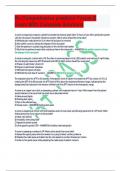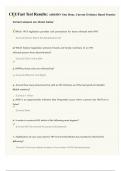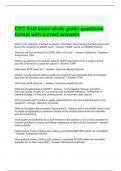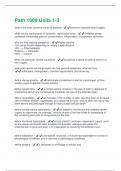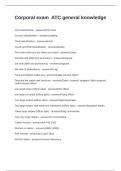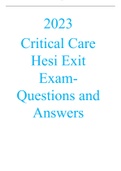L1. Persuasive Health Technology.........................................................................................................2
T1.1 A theory-based online health behavior intervention for new university students: study protocol
(Epton T, et al.)......................................................................................................................................7
T1.2 A theory-based online health behaviour intervention for new university students (U@ Uni:
LifeGuide): Results from a repeat randomized controlled trial (Cameron, et al.)................................10
L2. Persuasive Health Technology P2...................................................................................................14
T2.1 Using feedback through digital technology to disrupt and change habitual behavior: A critical
review of current literature (Hermsen, S et al.)...................................................................................19
T2.2 Effects of eating with an augmented fork with vibrotactile feedback on eating rate and body
weight: a randomized controlled trial (Hermsen, S et al.)...................................................................23
L3. Novel modes, Personalisation & Just-In-Time adaptive interventions...........................................24
T3.1 The effectiveness of health animations in audiences with different health literacy levels: an
experimental study (Meppelink et al., 2015).......................................................................................28
T3.2 A systematic review of tailored eHealth interventions for weight loss (Ryan et al., 2019)..........30
L4. Engagement, adherence, and the digital divide.............................................................................33
T4.1 Theoretical perspectives of adherence to web-based interventions: a scoping review (Ryan et
al., 2018)..............................................................................................................................................39
T4.2 Digital inequality during a pandemic: Quantitative study of differences in COVID-19–related
internet uses and outcomes among the general population (Van Deursen, 2020).............................42
L5. Social aspects of DHC.....................................................................................................................44
T5.1 A cross-cultural comparison of the processes underlying the associations between sharing of
and exposure to alcohol references and drinking intentions (Geusens et al., 2020)...........................47
5.2 A comparison of physical activity mobile apps with and without existing web-based social
networking platforms: systematic review (Petersen at al., 2019)........................................................49
L6. Immersive Health Technologies.....................................................................................................51
L7. Computer-Mediated Doctor-Patient Communication....................................................................56
7.1 Skype or Skip? Causes and Consequences of Intimate Self-Disclosure in Computer-Mediated
Doctor-Patient Communication (Bol & Antheunis)..............................................................................59
7.2 The effect of screen-to-screen versus face-to-face consultation on doctor-patient
communication: An experimental study with simulated patients (Tates et al., 2017).........................62
L8. Exam preparation...........................................................................................................................65
,L1. Persuasive Health Technology
Persuasive health technology= any technology purposely designed to influence, reinforce, change,
or shape health-related attitudes or behaviors.
Other often used definition:
eHealth (health applications) = the use of information communication technologies (computers of
any kind) to deliver or support the delivery of health services.
mHealth= the use of mobile wireless technologies for public health.
(health) Behavior change
COM-B model: a tool to identify barriers to behavior change and to plan interventions. It shows the
interactions between determinants and behavior. There are three main determinants/sources of
behavior:
, - Capability: whether a person has the knowledge, skills and abilities to engage in a behavior.
- Motivation: all the internal processes that trigger or inhibit a behaviour, and that ultimately
results in us performing a particular behaviour instead of any other possible competing
behaviour.
- Opportunity: external factors that make execution of a behavior possible.
For example: reduce the alcohol intake of a student
The COM-B model shows us what needs to change.
To know how to change it, we use designing interventions: Behavior Change Wheel and Behavior
Change Techniques (BCT's): coordinated sets of activities/BCT's designed to change specified
behavior patterns, usually spanning multiple intervention functions.
1. Understand the behaviour
2. Identify intervention options
3. Identify content
, BCT= a component of an intervention designed to alter or redirect causal processes that regulate
behavior: that is, a technique is proposed to be an active ingredient. For each intervention function,
several BCT's have been identified that contribute to this function.
T1.1 A theory-based online health behavior intervention for new university students: study protocol
(Epton T, et al.)......................................................................................................................................7
T1.2 A theory-based online health behaviour intervention for new university students (U@ Uni:
LifeGuide): Results from a repeat randomized controlled trial (Cameron, et al.)................................10
L2. Persuasive Health Technology P2...................................................................................................14
T2.1 Using feedback through digital technology to disrupt and change habitual behavior: A critical
review of current literature (Hermsen, S et al.)...................................................................................19
T2.2 Effects of eating with an augmented fork with vibrotactile feedback on eating rate and body
weight: a randomized controlled trial (Hermsen, S et al.)...................................................................23
L3. Novel modes, Personalisation & Just-In-Time adaptive interventions...........................................24
T3.1 The effectiveness of health animations in audiences with different health literacy levels: an
experimental study (Meppelink et al., 2015).......................................................................................28
T3.2 A systematic review of tailored eHealth interventions for weight loss (Ryan et al., 2019)..........30
L4. Engagement, adherence, and the digital divide.............................................................................33
T4.1 Theoretical perspectives of adherence to web-based interventions: a scoping review (Ryan et
al., 2018)..............................................................................................................................................39
T4.2 Digital inequality during a pandemic: Quantitative study of differences in COVID-19–related
internet uses and outcomes among the general population (Van Deursen, 2020).............................42
L5. Social aspects of DHC.....................................................................................................................44
T5.1 A cross-cultural comparison of the processes underlying the associations between sharing of
and exposure to alcohol references and drinking intentions (Geusens et al., 2020)...........................47
5.2 A comparison of physical activity mobile apps with and without existing web-based social
networking platforms: systematic review (Petersen at al., 2019)........................................................49
L6. Immersive Health Technologies.....................................................................................................51
L7. Computer-Mediated Doctor-Patient Communication....................................................................56
7.1 Skype or Skip? Causes and Consequences of Intimate Self-Disclosure in Computer-Mediated
Doctor-Patient Communication (Bol & Antheunis)..............................................................................59
7.2 The effect of screen-to-screen versus face-to-face consultation on doctor-patient
communication: An experimental study with simulated patients (Tates et al., 2017).........................62
L8. Exam preparation...........................................................................................................................65
,L1. Persuasive Health Technology
Persuasive health technology= any technology purposely designed to influence, reinforce, change,
or shape health-related attitudes or behaviors.
Other often used definition:
eHealth (health applications) = the use of information communication technologies (computers of
any kind) to deliver or support the delivery of health services.
mHealth= the use of mobile wireless technologies for public health.
(health) Behavior change
COM-B model: a tool to identify barriers to behavior change and to plan interventions. It shows the
interactions between determinants and behavior. There are three main determinants/sources of
behavior:
, - Capability: whether a person has the knowledge, skills and abilities to engage in a behavior.
- Motivation: all the internal processes that trigger or inhibit a behaviour, and that ultimately
results in us performing a particular behaviour instead of any other possible competing
behaviour.
- Opportunity: external factors that make execution of a behavior possible.
For example: reduce the alcohol intake of a student
The COM-B model shows us what needs to change.
To know how to change it, we use designing interventions: Behavior Change Wheel and Behavior
Change Techniques (BCT's): coordinated sets of activities/BCT's designed to change specified
behavior patterns, usually spanning multiple intervention functions.
1. Understand the behaviour
2. Identify intervention options
3. Identify content
, BCT= a component of an intervention designed to alter or redirect causal processes that regulate
behavior: that is, a technique is proposed to be an active ingredient. For each intervention function,
several BCT's have been identified that contribute to this function.

